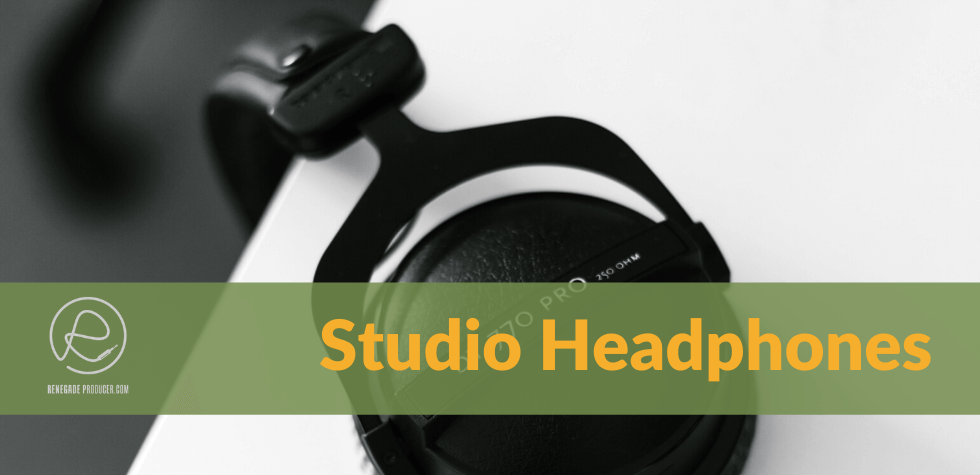25-step music production process checklist and video workshop >>>
Find the Best Studio Headphones for Your Home Music Production Studio With This Handy Guide

Find Out What to Look For in Professional Studio Quality Headphones + Common Pro Headphone Questions Answered + 6 Good Models to Get You Started!
So, you want to get the best studio headphones for your setup and all of a sudden you're faced with so many choices and all the marketing claims from headphone manufacturers that you don't know where to even start your hunt.
Don't worry because in this post below we answer common questions about studio headphones, look at
some of the main factors you need to consider before you buy and
shortlist 6 different starter pairs under $400 for you to look at before
you invest.
Let’s jump right into it with some of the more common questions you may have before you get your ideal headphones…
Common Questions About Studio Headphones:
Q: What are studio headphones used for?
Studio quality headphones are used for 3 main functions:
- Monitoring - Artists and instrumentalists use studio headphones to hear a mix of the track while they record their parts.
- Producing - Music producers use studio headphones to produce music with when they’re not using studio monitors.
- Mixing - Audio engineers and producers use studio headphones when they mix tracks, usually as an extra reference or as a way to check specific details in the mix such as reverb mix levels.
Q: What’s the difference between consumer headphones and professional studio headphones?
The main difference between consumer headphones and studio quality headphones is the frequency response.
Consumer
headphones are meant for listening to music so they'll often have a
curve that accentuates certain frequencies to make the listening
experience more enjoyable. At least in theory! ;-)
Studio headphones in most cases aim
for a flat frequency response so audio engineers, artists and producers
can get an accurate idea of the source sounds or mix they're working
with.
Q: Should you mix on headphones?
Short answer: Not all the time and not exclusively.
For a longer answer, check out this post where I respond to a Renegade Report subscriber who had this question.
Q: What should you look for in studio headphones?
Choosing the best studio headphones for your needs will depend on a
variety of factors. Here are the main considerations to keep in mind
when you start looking for your ideal headphones:
1. Function: Mixing or Monitoring
The first thing you want to be clear on is what you intend to use your headphones for.
Do you plan to mostly record with your headphones or mix with your headphones or both?
The answer to this question will determine in large part which types of headphones will be most suited to the job.
2. Type: Open-Back, Closed-Back or Semi-Open
The intended function will dictate which type of headphone you need to get.
Open-back
studio headphones are good for mixing and referencing as they tend to
have a more accurate response and image due to the fact that sound
pressure can escape. This lessens the chance of odd bass and mids especially since the sound can breathe. In most cases you want to avoid these for monitoring while tracking as they'll bleed into your recording.
Closed-backs
are the best studio headphones for recording since they provide isolation and
insulation. This means there’s less chance of the headphone mix
bleeding into the track being recorded and the artist can get a good mix
to record with.
3. Frequency Response
Different
makes and models of studio headphones have different frequency-response
curves. There’s no good or bad here. Some producers and engineers
like a slightly hyped curve and others don’t.
The aim is of
course a flat response but this is never truly achieved, no matter how
much the manufacturer’s marketing department will want you to believe
it. The most important thing is that you find headphones with a
response that works for you.
4. Isolation/Insulation
Isolation
keeps outside noises out and insulation keeps inside noises in. With
headphones this comes down to the design and materials used. If you want to track with your headphones then good insulation is a must.
5. Comfort
You’ll
often use studio headphones for extended periods of time. This means
that comfort is of extreme importance when you select headphones. Some
producers prefer over-ear headphones while others like on-ear designs
more. The type of materials used for the pads also make a difference
since some materials might get uncomfortable when you sweat.
6. Build Quality
Studio
headphones, especially those used for tracking, need to be robust
because artists often aren’t as respectful with the gear as you may be
and accidents happen.
Another reason why build quality is
important is because any rattles or unwanted sounds caused by the
headphones will affect the quality of the sound you hear while using them.
7. Impedance
Impedance
refers in simple terms to the amount of resistance an AC circuit has to
the current running through it. It's the equivalent of Resistance in DC circuits. Impedance is measured in Ohms.
Q: What does Ohm mean with headphones?
The Ohm measurement you see on headphones or in headphone specs refer to what's called load impedance. So, this is the amount of impedance the headphones have to the output signal from your audio interface headphone output.
So, the headphone output has an output or source impedance and the headphones have a load impedance.
When you have equal source/output impedance and load impedance you maximize the power transfer between your amp and your headphones.
Q: Are higher ohm headphones better?
Higher
impedance models of studio quality headphones will handle higher levels
of audio better but they need a strong enough current to drive them well.
So, you want to match your output and load impedance as closely as possible. Check the output impedance of your audio interface headphone output in the specs and compare that to the headphones you intend to get.
In general 32 ohms have become quite standard across the board for consumer and pro headphones as they function well even with lower outputs such as mobile phones. 80 ohms is a good middle ground impedance and you shouldn't really need anything more than 250 ohms in a professional studio setting.
Many modern interfaces can handle 250 ohms and even above, like with my trusted RME interface for example, but it's always best to check your audio interface specs or contact the manufacturer before you invest in your chosen studio headphones.
This is an important aspect to consider when you're trying to get the best studio headphones for your home studio, one which is often overlooked.
For a good basic overview of headphone impedance I suggest you check out this excellent post over at Headphonesty.
8. Budget
Studio headphone prices differ wildly so budget is something you need to consider.
The
saying “you get what you pay for” is mostly true when it comes to
headphones because the higher-end models are often manufactured using
better materials. Note that this isn't always the case as there are some headphones that are marketed really well and priced quite high even though they aren't the best studio headphones you can get.
Q: What headphones do professional producers use?
Some of the favorite studio headphones used by professional producers include headphones from the following manufacturers:
Sennheiser, Beyerdynamic, Audio-Technica, Sony, Shure and AKG.
Q: What are the best studio headphones?
There are no such thing as "the best studio headphones". Sure, some headphones are better in terms of build quality, frequency response and design. You cannot expect a cheap as chips pair of cans to compare to the top-of-the-range models which costs in the multiples of $1000s.
That said, once you get above a certain price-range you can find some really decent headphones. Then, it simply becomes a case of finding the best studio headphones for you. There are also the odd pair of cheaper headphones that are surprisingly good value for money.
So, quit the search for "the best studio headphones" and find a pair that works best for you.
To help narrow down the search you'll find 6 hand-picked pairs below, 3 closed-backs and 3 open/semi-open-backs.
The Best Studio Headphones to Get the Hunt Started With:
You won't find a list of 20 best studio headphones here because that won't make your life any easier. Instead we've kept it simple. 3 decent choices all under $400 to start your search within each category.
Remember, studio headphones aren't part of your core studio equipment, so splashing out on a pair that costs you $1000s shouldn't be a priority when you could spend that money better on core components like interfaces or monitors. The headphones listed below are all a good way to get started and they won't break the bank.
All of these suggestions are based on the author's biased opinion and music production experience. Absolutely no reviews, scientific research or polling went into the making of this list. ;-)
3 Good Closed-Back Studio Headphones:
1. Sennheiser HD280 Pro
2. Beyerdynamic DT770 Pro
3. Audio-Technica ATH-M50X
3 Good Open or Semi-Open Studio Headphones:
4. Beyerdynamic DT 990 Pro
5. Sennheiser HD 650
6. AKG K240 Studio
The links above are affiliate links which means you support this site when you make purchase via any of the links as RenegadeProducer.com receives a referral commission when you buy. Thank you kindly for your support!
One Final Tip!
It's always best to try before you buy when it comes to music production equipment. So, if you have a brick-and-mortar retailer near you that offers demo facilities then do take advantage of the fact.
Alternatively, do some research, check out reviews as much as possible and make sure you spend your hard-earned money right.
I hope this little guide has answered your questions and helped you with your hunt for the best studio headphones for your home studio!
Popular Related Pages:
How Do I Choose a Music Production Computer?
Computer Sound Cards / Pro Audio Interfaces Selection Guide for Music Producers
"Any Recommended Studio Monitors for the Renegade Music Producer?"
Room Acoustics and Your Home Music Studio
7 Home Recording Studio Changes That Can Improve Your Sound Straight Away
3 Essential Home Studio Design Considerations for Music Producers & Beatmakers


Learn to understand equalisers and frequencies to supercharge your mixing skills and get results, fast...

New producer? Learn everything you need to produce your first professional track right now...

Would you like to discover the simplest and easiest way to learn music theory as a music producer?
Share this post. Spread the knowledge so other producers can benefit too:
- Renegade Producer
- Home Studio
- Pro Studio Headphones
ⓘ Some pages contain affiliate links so I might earn a commission when you buy through my links. Thanks for your support! Learn more

